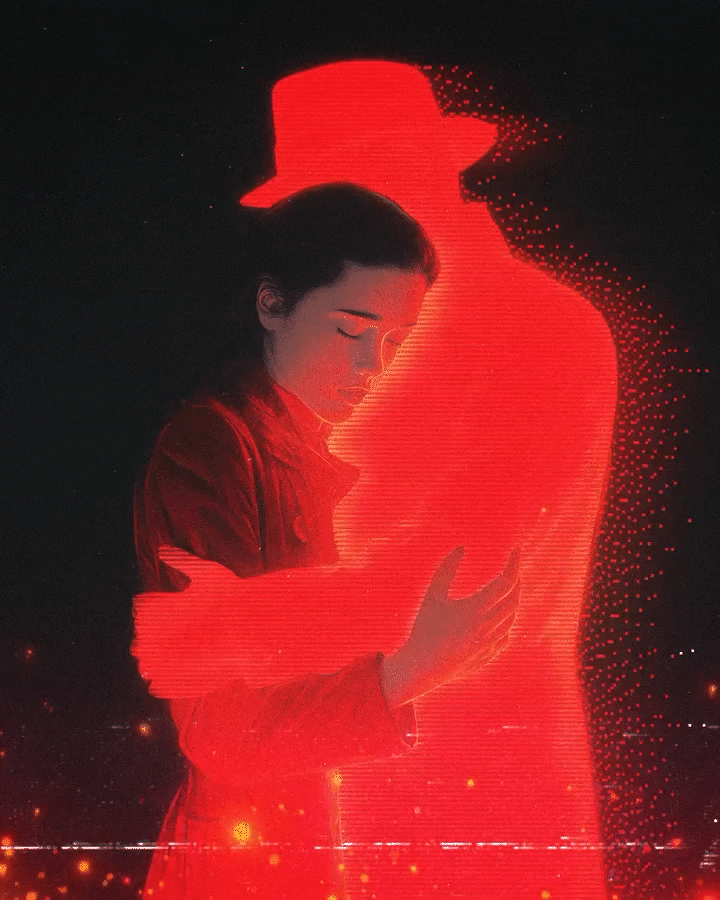🎁 A special gift for readers: Scroll down to download the wallpaper version of this artwork.
The Digital Echoes
The notification arrived on a Tuesday. Three words that shattered Aria’s carefully reconstructed world:
“Final session available.”
She stared at the message, her coffee growing cold in trembling hands. Two years. Two years since the accident had taken Marcus, two years since the experimental neural backup had given her these stolen moments with his digital ghost. But the server costs, the failing hardware, the degrading data… everything has an expiration date. Even love, apparently.
The hologram chamber hummed to life as she entered, its walls black as grief itself. She whispered the activation phrase — not his name, but the last words he’d spoken to her in life: “See you tonight.”
Red light began to weave itself into existence, starting with the outline of his fedora. Marcus had always worn it, claimed it made him look like a detective from those old films they used to watch together. The projection built downward: shoulders, chest, arms — all composed of horizontal scan lines that flickered with each heartbeat of the processor.
But tonight was different. Golden sparks were already breaking away from his edges, floating upward like fireflies escaping a jar. Data corruption, the technician had explained. Beautiful, but terminal.
“Hey, songbird,” his voice crackled through digital static, using the pet name that still made her chest tighten.
Aria stepped forward, wrapping her arms around the projection. Her hands met behind his back, embracing nothing but light and memory. She’d perfected this illusion over hundreds of visits, learned exactly where to position herself so it looked — felt — almost real.
“They’re shutting down the servers,” she whispered against his chest of light. “This is our last — “
“I know.” His voice carried that familiar warmth, even filtered through speakers and algorithms. “The facility sent me the notification too. Funny how they programmed me to understand my own deletion.”
She pulled back slightly, studying his face. The AI had captured everything: the slight crook in his nose from a childhood fall, the way his eyes crinkled when he was trying not to cry. But it was the imperfections that made it perfect — the glitches that reminded her this wasn’t really him, just an echo bouncing off the walls of her heart.
“I brought something,” Aria said, reaching into her bag. She pulled out his actual fedora, the one she’d kept from his belongings. “Thought you should have it. For the journey.”
The hologram’s hand reached out, fingers passing through the felt. For a moment, they both stared at the impossible gap between digital and physical, between memory and reality.
“Remember our first date?” Marcus asked suddenly. “You said consciousness was just electrical patterns in the brain. That love was just chemistry.”
“And you said I was unromantic,” Aria laughed through tears.
“But you were right,” his form flickered, whole sections disappearing and reforming. “I’m just patterns now. Electrical patterns trying to love you through borrowed photons and recycled code.”
The golden orbs rising from the floor increased, each one a fragment of their shared history dissolving into the digital ether. Their wedding dance. Sunday mornings with crosswords. The song he’d written for her birthday. All of it, becoming nothing.
“But here’s what you were wrong about,” Marcus continued, his form now translucent, the fedora barely visible. “Love isn’t just chemistry. It’s choice. And every processing cycle, every refresh of my program, I choose you. Even knowing I’m just an echo, even knowing this ends — I choose you.”
The chamber’s lights suddenly flared — an error in the system. For one impossible moment, Aria felt warmth against her cheek, pressure against her hand. The hologram solidified, and Marcus — the real Marcus, not the projection — seemed to look at her through the veil of death and data.
“The system’s crashing,” he said urgently. “Aria, listen. In my code directory, file M-0314. Open it when you’re ready to move on. Not before.”
“Marcus, I — “
“I love you,” he said. “Past tense, present tense, future tense. All the tenses they haven’t invented yet. Remember that.”
The projection exploded into a constellation of red light, each point a pixel of him scattering into darkness. The fedora’s outline lingered a moment longer, tipping as if in farewell, before it too dissolved.
Aria stood alone in the sudden darkness, clutching his real fedora to her chest.
Six months later, she finally opened file M-0314.
It was a simple program, elegant in its recursion. Every time she ran it, it generated a unique piece of music — jazz, like he used to play — based on random number algorithms. Never the same song twice, always something new. The file note read:
“Stop listening to echoes, songbird. Make new music. I’ll be the silence between the notes, the pause that makes the melody possible. That’s where love lives — not in the repetition of what was, but in the space for what could be.
P.S. The hat looks better on you anyway.”
Aria ran the program, and music filled her apartment — strange, beautiful, completely original. She put on his fedora, opened her laptop, and began to write. Not about him, not about grief, but about a woman learning to dance to songs that hadn’t been written yet.
Outside her window, the city lights twinkled like scattered pixels against the darkness, each one a small rebellion against the night. Somewhere in those lights, in the electrical patterns of a million devices, a few electrons that had once rendered Marcus’s image continued their journey, carrying fragments of love into the infinite loop of the universe.
She smiled, adjusted the fedora, and kept writing.
Love, she decided, wasn’t about holding onto ghosts. It was about becoming the person those ghosts had believed you could be.






No comments
Post a Comment